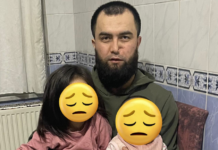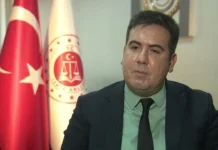Esra Solin Dal, a Kurdish journalist who was previously arrested and released pending trial, was allegedly subjected to a number of rights violations including strip-searches during her pretrial detention, the Mezopotamya news agency reported on Monday.
“I have written about strip-searches many times, saying they are a violation of rights. Yet, I was subjected to them myself. Despite my objections, I was forced to undergo a strip-search twice,” Dal said.
Dal was denied access to her lawyers during her detention by the police for four days without knowing the charges against her and was held in a cell by herself for nearly 25 days during her pretrial detention.
Dal, together with two other Kurdish journalists, Mehmet Aslan and Erdoğan Alayumat, had been detained as part of an İstanbul-based investigation and was arrested by a court last month. She was indicted on terrorism charges 12 days after her arrest.
Dal’s articles include an interview with documentary filmmaker Ertuğrul Mavioğlu, interviews with female lawmakers from the pro-Kurdish Peoples’ Equality and Democracy Party (DEM Party) and news reports about the “isolation” imposed on Abdullah Öcalan, the jailed 74-year-old leader of the outlawed Kurdistan Workers’ Party (PKK).
The PKK has been in an armed conflict against the Turkish state for decades and is designated as a terrorist organization by Turkey as well as much of the international community.
The “isolation” of Öcalan, who has been jailed in a high-security prison on İmralı Island in the Sea of Marmara since security agents seized him in Kenya in 1999, refers to his inability to speak with his lawyers for years.
Six posts by Dal on her X account were also included in the indictment as evidence.
Alayumat’s interview with Kurdish politician Hatip Dicle on October 9, 2020 was also among the articles cited as evidence, with the prosecutor claiming that through the article, the journalist aimed to “denigrate the Republic of Turkey in the international community.”
Among Aslan’s news articles that were considered evidence against him were his reports on the arrest of his colleague, MA reporter Fırat Can Arslan, and a case filed against MA editor Sedat Yılmaz for his journalistic activities.
Four of the journalists’ social media posts were also considered to include “elements of a crime” in the indictment.
The first hearing will be held at the İstanbul 25th High Criminal Court on October 15.
Kurdish journalists in Turkey frequently face legal harassment, stand trial and are given jail sentences for covering issues related to Kurds and the outlawed PKK.
Rights groups routinely accuse Turkey of undermining media freedom by arresting journalists and shutting down critical media outlets, especially since President Recep Tayyip Erdoğan survived a failed coup in July 2016.
Turkey, which has been suffering from a poor record of freedom of the press for years, ranks 158th among 180 countries in RSF’s World Press Freedom Index published on May 3 on the occasion of World Press Freedom Day.















